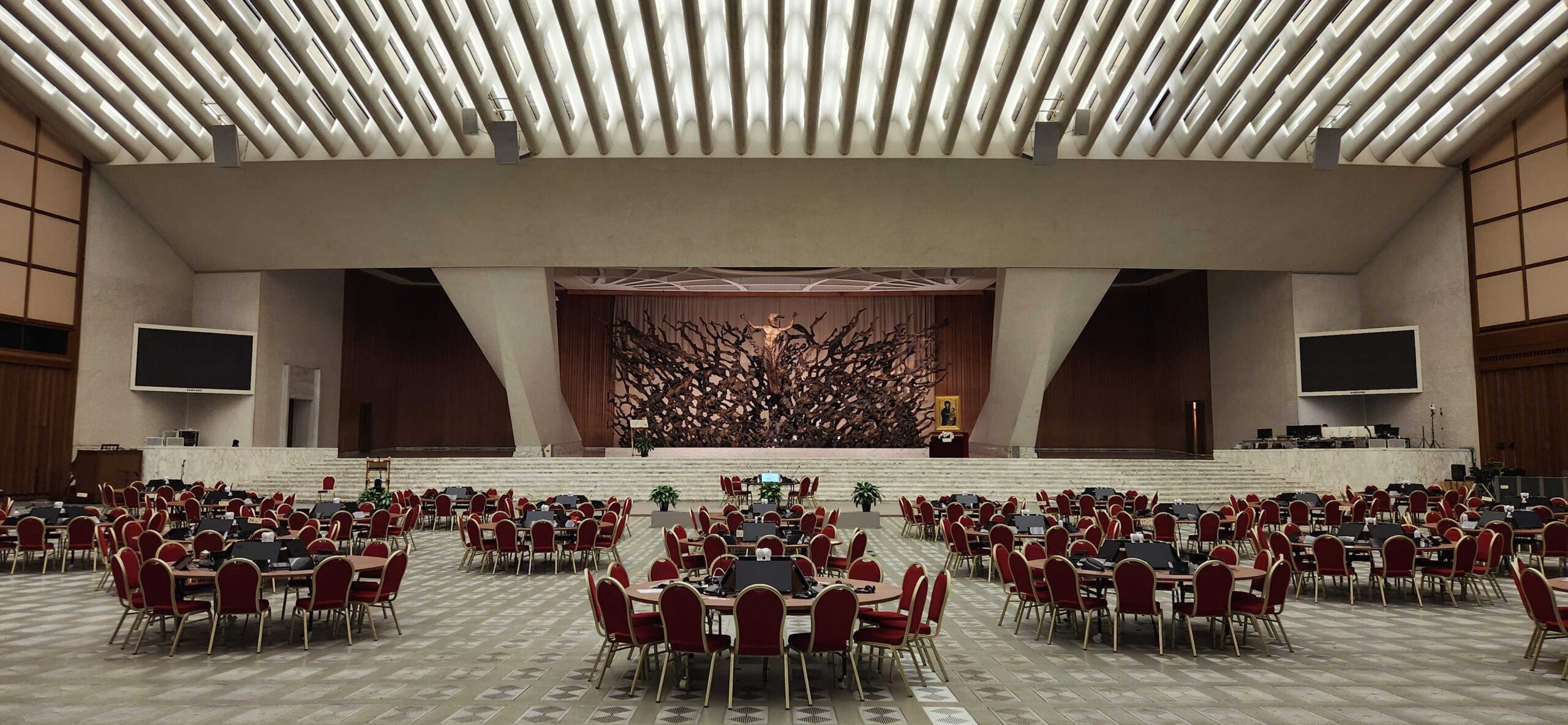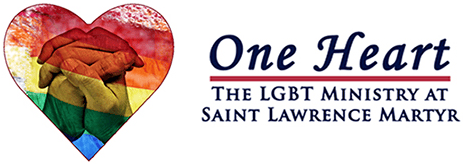The second and final session of the Synod on Synodality has just concluded. And what I noticed most this year is how much the attitude towards LGBTQ issues has changed—and for the good. That was a surprise, especially given what I experienced last year. After the First Session of the Synod, I often told friends that when someone said, “Father James, may I speak with you?” it usually meant one of three things.
First, someone wanted to thank me for ministering to LGBTQ people: “Thank you for your ministry,” said one cardinal from Asia. “You’ve been a big help in my diocese.” Second, a cardinal, bishop, priest, religious or lay leader would ask for advice: “What would you suggest doing in my diocese for gays and lesbians?” Finally, someone wanted to interrogate me: “Do you or do you not support church teaching?” (For the record, I do.)
I was surprised to find the conversations about LGBTQ Catholics much friendlier, much more relaxed and much more open this year.
Some of those kinds of interactions happened again this year, but I didn’t experience anything like the contentiousness that seemed to animate certain interventions or roundtable discussions last year, when some people voiced their opposition to even using the term “LGBTQ” And you might remember that last year, there was no mention of ministry to LGBTQ Catholics in the Synthesis Report, because the writers feared the topic might alienate some delegates and jeopardize the passage of paragraphs on the overall welcome and inclusion of various groups.
This year felt much different.
Before I go any further, let me say that I don’t know the minds of all the delegates. And there was still opposition to LGBTQ outreach and the Final Document included only a passing reference to it. Also, I’m not going to quote anyone from the plenary sessions or roundtables—or even the coffee breaks, where some of the most important conversations happened. But I can say this: I was surprised to find the conversations about LGBTQ Catholics much friendlier, much more relaxed and much more open this year.
Some delegates who had made fiery interventions last year now seemed more at ease talking about the topic; people who had opposed reaching out to LGBTQ people treated me like a friend; and discussions about pastoral ministry to this community were more congenial. If you had told me this would happen, I wouldn’t have thought it possible.
How did this happen? Why did this happen? Let me suggest a few possible reasons.
First, shifting the 10 topics (including “controversial doctrinal, pastoral and ethical issues”) from the synod’s discussions (which this year focused on synodality itself) and giving them to the various study groups meant that delegates seemed more relaxed about LGBTQ issues, probably because they knew that they weren’t going to have to “defend” their positions—or, as one delegate said, “come with daggers drawn.” That meant that it was easier to have open and friendly conversations about the topic. There wasn’t going to be a “debate” or a “showdown,” so it could be discussed more calmly.
It is easier to have difficult conversations with people once you are friends.
Second, my sense is that last year was a kind of “coming out” for the topic in the church. One cardinal said to me that last year was probably the first meeting of the universal church where the topic was brought up so regularly and the term “LGBTQ” was used so often. So perhaps it was not surprising that it proved so explosive for people from places where the topic is still anathema. But, as in families with an LGBTQ child, once the initial shock is over, people settle down and start to ask themselves, “How can I love my child?” Or, in the case of the church, “What does this mean for my diocese, parish or family?”
My sense was that if last year was a “coming out,” this year was a settling-in. Again, this is not to suggest that every delegate felt that way. There were some who were still quite hostile. But overall, things seemed much calmer.
Third, not using the term “LGBTQ” seemed to enable people to listen more. As I have written before, for many people, that term is incendiary, implying an advocacy organization, a lobbying group or a protest march. This may be unfair, but that is how the term is still seen in some parts of the church, particularly in some parts of Eastern Europe and Sub-Saharan Africa. Speaking instead about “gays and lesbians,” “sexual minorities” or “gays, lesbians, bisexual and transgender people” is more or less the same thing, but people can hear it more readily. But even then, I heard people use the term more often and more freely.
Fourth, the response to “Fiducia Supplicans,” the 2023 Vatican declaration that allowed for the blessing of same-sex couples under certain circumstances, meant that people may have felt that their positions had already been staked out, so there was less need for debate.
As all the delegates were aware, the document has been “received” by most parts of the church, while SECAM (the Symposium of Episcopal Conferences of Africa and Madagascar) issued a statement saying, in effect, that it would not be implemented in their dioceses. (Interestingly, a few African bishops told me the statement did not reflect their own thinking.) But overall, the issue of same-sex blessings was also, in a sense, taken off the table, since people have had their say. This made conversation around LGBTQ issues easier.
There is a general consensus that the church needs to reach out to LGBTQ people.
Fifth, polygamy. This may seem surprising, but the open discussion during the Synod about ministering to people in polygamous relationships helped some delegates see that LGBTQ Catholics were asking for the same pastoral approach. In a video message to the Synod, which was later made public, Cardinal Fridolin Ambongo, O.F.M. Cap, the archbishop of Kinshasa, who heads the commission on polygamy, said that those in polygamous relationships needed to be treated with closeness, active listening and support without judgment. We must clarify “pastoral accompaniment” and “fraternal and respectful dialogue” with those on the “existential peripheries,” said Cardinal Ambongo.
Several delegates told me this helped them see a way forward for ministry to LGBTQ people and to see that outreach to these two groups, whose lives sometimes are not in full conformity with church teaching, as linked. In short, if we can do that with people in polygamous marriages, went the thinking, we can do that for LGBTQ people.
Sixth, as Cardinal-elect Timothy Radcliffe, O.P., said last year, quoting St. John Paul II, “Affective collegiality precedes effective collegiality.” In other words, it is easier to have difficult conversations with people once you are friends. And that was proven true. If last year there was some caution or even suspicion, this year we were far more friendly with one another. Jokes and laughter at almost all the tables were common. Once again, this made for more open conversation around controversial topics.
Thanks to the Synod, LGBTQ issues are now more “on the table” for the universal church.
Seventh, there may have been some conversion happening. Several delegates said, “I’ve been thinking about what you said last year.” Or “I heard from some LGBTQ people in my diocese this past year.” Our Outreach event at the Jesuit Curia during the Synod also drew a few dozen delegates, including several cardinals, archbishops and bishops. I’m not saying that the event was responsible for a change in attitude, but from the number of delegates who mentioned it in the days afterwards, it probably didn’t hurt.
What does all this mean?
For one thing, the Final Document spoke of reaching out to people who felt “the pain of feeling excluded and judged because of their marital situation, identity or sexuality,” a phrase that had to be approved by the synod delegates—and the stakes were higher this year, since this was the synod’s last official document. So there is a general consensus that the church needs to reach out to LGBTQ people, even if the term is not used. (Frankly, the inclusion of the word “identity” was a pleasant surprise to me.)
Second, over the past two years, more than 350 Catholic leaders from around the world—cardinals, archbishops, bishops, priests, men and women religious, lay leaders—may have heard about LGBTQ people in ways that they hadn’t before. That is surely to the good.
Third, thanks to the Synod, the topic is now more “on the table” for the universal church. It will take time for the topic to ripen in certain cultures and dioceses, but the topic is now more “out.”
These are just my impressions, and so are naturally subjective. But in the past two years in the Synod Hall, the overall attitude towards LGBTQ issues seems to have changed noticeably—for the good. Much of that was a surprise to me. But the Holy Spirit is full of surprises.




